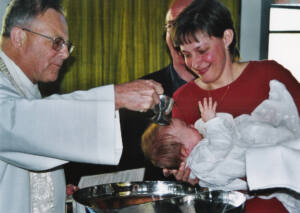WelCom March 2024
Monsignor Charles Harold Pascal Cooper, a much-loved and respected priest of the Archdiocese of Wellington, died on 3 January 2024, aged 90, at his home in Wellington. Ken Joblin, organist and chorister at the Cathedral of the Sacred Heart in Wellington from 1988–2000, and now Sacred Music Adviser for the Catholic Diocese of Christchurch, pays tribute to his former mentor and guide.

The heading for this article is taken from a letter I wrote to Monsignor Charles Cooper in January 1991, at the conclusion of his time at Sacred Heart Cathedral. As he has now gone to God, it is a comfort to know these words were said while he was in his prime as a priest.
By the late 1980s, Fr Charles Cooper had succeeded Monsignor Hugh Doogan as Dean of our Cathedral. His appointment was inspired, as in him, we had the unique combination of a well-formed priest, who was also a Church musician and a liturgist. These gifts were very much to the fore in the Mass celebrated by Pope St John Paul II at the Basin Reserve in late 1986.
After strengthening and repurposing Sacred Heart as a cathedral, it was re-opened in late 1987. The organ, which had been taken out of the building for restoration and enlargement, did not return until 1991, just as Mons Cooper began his appointment to St Mary’s, Nelson. Thanks to his vision for cathedral liturgy, Dean Cooper was able to support the establishment of what he later described as ‘a more than competent choir and an accomplished organist’ in Dianne Halliday. She worked seamlessly with him, accompanying and directing the choir from a grand piano, donated by the Cooper family, among others.
Dean Cooper did everything with precision and an eye for detail. Because of his dignified and measured liturgical approach, our gaze was certainly lifted heavenward. As I wrote to him: ‘Having a Dean who is himself very musical and has had extensive training in music and its place in liturgy is not something we can expect. Nor is it easily found. We have simply been very fortunate to have someone like that who can supplement support for what we do, with keen musical interest and knowledge.’
Dean Cooper was a gifted and well-spoken homilist. I wrote: ‘I recall one homily of yours in 1989, which I found particularly helpful to me and others around me at the time. In it, you spoke of forgiveness and reconciliation. The bottom line of it was that it is not enough to bury the hatchet. One had to bury it in an unmarked grave so that it never would be dug up again and used as a tool against an individual. Only then would there be true forgiveness.’
I further wrote: ‘It was a stroke of luck I happened to walk into the Cathedral at a time when you were there and that you offered the organ scholarship to me on the spot. I interpret that action as a sign from God that I have talent in playing the organ and that I should use it for the benefit of the Church as well as of myself.’ His initiative was key in my commitment to the Church’s sacred music.
I leave the final words of this article to Mons Cooper. While they were spoken to conclude his 1994 lecture series for liturgical musicians, they seem all the more apt now.
‘I want to thank you for letting me share this time with you. I hope you will have a sense of the privilege that has been given to all of us to serve God’s people in the ministry of music. I hope you will always experience sustained enjoyment and joy in fulfilling the liturgical task which is your own, and I pray God will bless and sustain you in your ministry. May we all rejoice to meet and sing again in the heavenly choir in the song that is eternal.’ – Charles P. Cooper
Fr Michael McCabe led the Requiem Mass for Monsignor Cooper on 9 January at Sacred Heart Church, Petone. In his homily he shared fond and enlightening memories.
‘Those of us mentored by Charles in liturgy and music soon learnt to follow his instructions honed by his time as Chaplain to the Royal New Zealand Air Force. Flight Lieutenant Cooper was no shrinking violet!
‘Charles was ordained a priest on 25 July, 1960. The Second Vatican Council (1962–1965) gave birth to a new way of thinking about [worship], Church and ministry – both lay-ecclesial and the ordained priesthood.
‘In a time of great transition for the Body of Christ, Charles brought hope and compassion, meaning and laughter, and joy and healing, as he lived out this gospel in a spirit, a courageous spirit, of collaboration with all the people of God, including those who found themselves on the boundaries of the Body of Christ, or their families, or their communities. This was how he bore much fruit in the living out of this gospel.
‘Charles: We pray thanks for your compassion born of vulnerability and rich humanity. And we pray thanks for your generative love and perseverance in season and out of season in Christ. Rest in peace and pray for us for our need is now greater….’